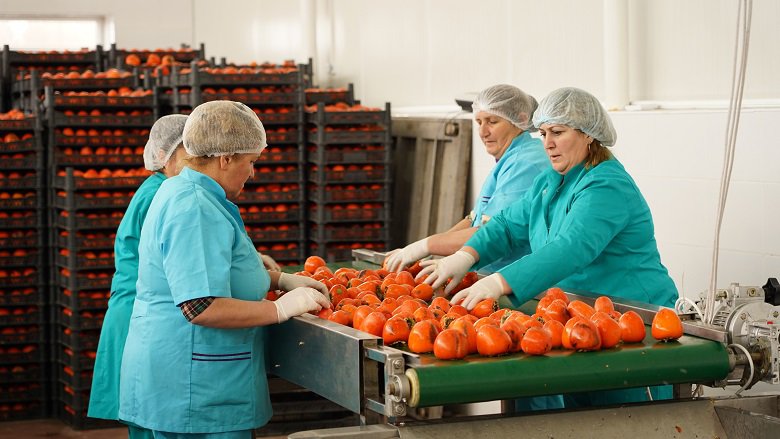Challenge
Oil drives the Azerbaijani economy. But in recent decades, the country and its development partners have sought to decrease this reliance by boosting other sectors that could lead to a more diversified economy. Agriculture was identified as the strongest candidate, with high potential to alleviate poverty as well: in 2008, over half of the country’s poor lived in rural areas, and most were engaged in agriculture.
When the ACIP was appraised in 2013, agriculture employed 40% of the Azerbaijani workforce—more than any other industry—but only contributed 5% of GDP. This underperformance was caused by challenges such as lack of improved seeds and productive livestock breeds, outdated processing technologies, a market structure that did not encourage long-term investment and planning and limited access to funding.
Approach
Two prior World Bank projects (the Agricultural Development and Credit Projects) began to address these gaps from 1999 to 2012. They laid the groundwork for the ACIP, which was approved in 2013. A technically complex implementation, the ACIP spanned multiple interventions with the core objective of commercializing agriculture in Azerbaijan and increasing the sector’s marketed output by focusing on (i) improving plant and animal health and food safety; (ii) developing agribusiness value chains; and (iii) providing financial services to agribusinesses.
Through four components and five sub-components the ACIP team could shift emphases to successfully adapt to challenging circumstances such as a currency devaluation crisis in 2015, COVID-19, a changing institutional landscape, and the outbreak of armed conflict. This flexibility, along with the project’s alignment with the Azerbaijani government’s aspirations, as expressed in its Strategic Vision for agriculture and other key documents, were key to success that extended beyond the project’s original objectives.
Results
The ACIP successfully provided comprehensive support to the government’s objective to diversify Azerbaijan’s economy and boost the competitiveness of agriculture, creating employment and income-generating opportunities in less developed areas of the country.
For the project’s core objective, 60% of beneficiary agribusinesses and value chains funded by the project’s credit line and grant facilities in 2015–2019 achieved an increase in marketed output (or sales) of 40% or more. The average increase among this group was 69.5%. Overall, 118 agribusinesses and value chain sub-projects received sub-loans and grants from 2015 to2021.
In pursuit of its overall goal of enhancing the competitiveness of agriculture, the ACIP achieved several firsts for Azerbaijan in plant and animal health and food safety, including:
- First-ever full flock vaccination approach, inoculating 6.5 million sheep and 2.37 million cattle
- A functioning Animal Identification and Registration System
- Developing a new plant health curriculum and introducing a new course on plant protection at the Agrarian University
ACIP also provided integrated pest management training to 1,404 farmers, specialists, and officials for key crops, resulting in higher yields on demonstration plots and lower pesticide use. The project also delivered a large-scale practical and applied training program to 1,373 private field veterinarians.
In addition, ACIP’s 12 value chain sub-projects had 110% higher sales in 2021 than the baseline, and their production increased by 73% on average. In total, 63.2% of participants in value chain sub-projects were women, exceeding the original target of 20%.
The quality of seeds also rose considerably because of the project’s work to bolster labs, provide equipment, and fund research:
- Seed lot germination levels rose from 75 to 90%
- Modern seed cleaning equipment on seed farms increased quality seeds by 14.2%
- Seed cleaning capacity increase three-fold, from 4 to 12 tons per day.
Bank Group Contribution
The total cost of the ACIP project was $52.86 million, of which IBRD provided $34.42 million in investment project financing. The remaining $18.44 million was contributed by the Azerbaijani government as counterpart funding.
Partners
The design of the ACIP fostered collaboration with other development partners. For example, it complemented the FAO’s Phytosanitary Support Project that would provide technical assistance and training for strengthening state phytosanitary control services. It also aligned with three key pre-existing strategies on food safety, veterinary services, and phytosanitary actions developed with assistance from the FAO, the World Organisation for Animal Health (WOAH), and International Plant Protection Convention (IPPC), respectively.
In terms of local partners, the Azerbaijani government contributed $18.44 million to the project. Central to the ACIP’s success was its project management unit located at the Agrarian Credit and Development Agency under the Ministry of Agriculture. The unit’s core staff carried over from the ADCP-II project that preceded it.
Moving Forward
The ACIP created a stable institutional environment that favors the sustainability of its interventions. It formed a cadre of professionals in the areas of food safety, phytosanitary, animal health and veterinary, seed sector, and financial services to agribusinesses. This talent and knowledge will allow agencies to continue to deliver beyond the life of the project.
The relevant Azerbaijani agencies are also well positioned for sustained use of reflows (funds repaid by borrowers) for agri-lending in the future. During the project, the Ministry of Agriculture used reflows to finance an additional 102 agribusiness enterprises. The Ministry intends to continue this practice.
Beneficiaries
Overall, ACIP directly benefitted 6,381 farmers by providing agricultural assets or services (1,947 of whom were women).
The project also had an outsized positive impact on employment for women. Of the 1,366 jobs created under value chain sub-projects, 1,072 (or 78.5%) were held by women. Through project lending, 2,016 new jobs were created at agribusinesses, 827 of which were held by women.
The project also brought major indirect benefits through knowledge spillovers. The value chain sub-component alone served 1,373 farmers not part of the projects who were able to improve their practices by attending training or visiting beneficiaries’ fields to learn new technologies and techniques.
